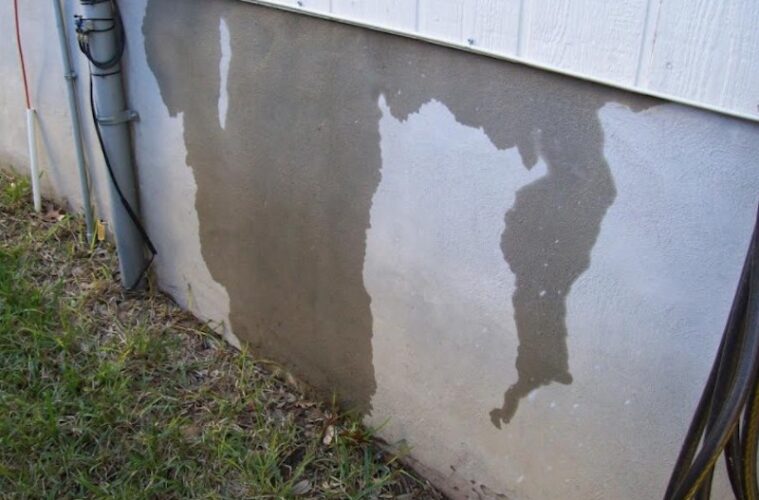If you’re a homeowner, you know how important keeping your property in good shape is. However, one issue that can arise is a slab leak in the plumbing underneath your home’s foundation.
So, how do you find the signs of a slab leak? Just ask yourself! Are you noticing higher than-usual water bills, damp or warm spots on your floors? These and more could be signs of a slab leak around your home.
If left unchecked, a slab leak can cause significant damage to your home. Let us guide you through some signs of a slab leak around your home and what to do if you suspect you have one.
What’s a Slab Leak?
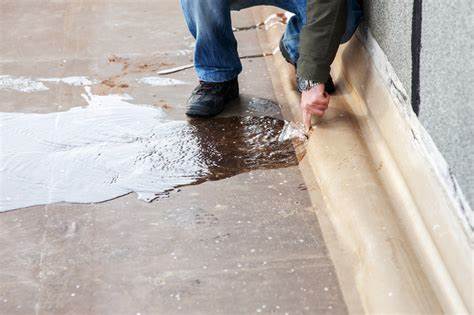
source: pinterest.com
If you don’t correctly know what a slab leak is, you won’t be able to identify the signs when it happens. So, here’s a small briefing of what it is:
A slab leak is a plumbing issue underneath your home’s concrete slab foundation.
This can happen when a water pipe or sewer line underneath your home’s foundation leaks. The water or sewage can then seep through the foundation and cause damage to your home.
Moreover, slab leaks can be caused by several things, including shifting soil, poor construction, or simply aging pipes. So, be on the lookout for signs because it’s essential to act quickly to minimize the deterioration.
So, if you notice anything unusual around your home, it’s time to call a professional because it takes both experience and proper equipment to locate and fix a slab leak.
7 Signs of a Slab Leak to Look Out for
What unusual things can you notice because of a slab leak? Well, the unusual things are the signs of a slab leak. So, let’s dive into it!
Higher than Usual Water Bills
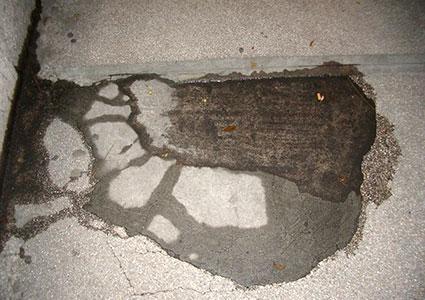
source: pinterest.com
Have you noticed that your water bills have been higher than usual lately? This could be a sign of a slab leak.
When a water pipe underneath your home’s foundation starts leaking, it can cause your water bills to skyrocket. Even a small leak can waste hundreds of gallons of water daily, adding up to a hefty bill at the end of the month.
According to the Environmental Protection Agency, the average American household uses about 300 gallons of water daily. But if you’re experiencing higher-than-usual water bills, you should figure out why to get the necessary repairs.
Damp or Warm Spots on Your Floors
Have you noticed any damp or warm spots on your floors lately? If so, it could be a sign of a slab leak. Slab leaks can cause water or sewage to seep through your foundation and into your home, creating damp or warm spots on your floors.
According to the National Association of Home Builders, slab leaks are one of the homeowners’ most common plumbing problems.
So, if you notice any unusual moisture or temperature changes on your floors, it’s worth investigating further to see if a slab leak needs to be addressed. Don’t ignore these warning signs – they could lead to bigger problems down the line.
The Sound of Running Water
If you wake up suddenly to running water sounds in the middle of the night, although all taps are closed, don’t be alarmed. It’s not a ghost! But it’s most possibly a slab leak.
When a pipe underneath your home’s foundation starts leaking, it can cause the sound of running water to become audible throughout your home.
Moreover, slab leaks are often difficult to detect since they’re hidden beneath the concrete slab, but the sound of running water is a telltale sign that something is amiss.
So, if you hear running water when you shouldn’t, it’s worth calling a professional plumber to investigate further and see if a slab leak needs fixing.
Cracks in Your Walls or Foundation

source: pinterest.com
Usually, we don’t pay heed to little cracks on the wall, but the cracks could be a sign of a slab leak. When water or sewage seeps up through your foundation, it can cause the soil to shift, creating gaps in your walls or foundation.
However, various things can cause a slab leak around your home, including shifting soil, poor construction, or simply aging pipes.
So, if you notice any unusual cracks in your walls or foundation, it’s worth investigating to see if there’s a slab leak. Don’t just ignore these warning signs – they could lead to bigger problems down the line.
Low Water Pressure
Several plumbing issues around your home can cause low water pressure, including a slab leak.
Low water pressure is actually a very common sign of a slab leak, occurring when water leaks from a pipe beneath your home’s foundation. These leaks can be challenging to detect since they’re hidden beneath the concrete slab.
However, if you’re experiencing lower-than-normal water pressure and can’t identify any other cause, it’s worth calling a professional plumber to investigate. Don’t wait until the problem worsens- call a professional as soon as you notice any signs of low water pressure.
Damp Carpet or Flooring
Your flooring or carpet shouldn’t be damp or wet, but if it is, you most probably have a slab leak.
As water seeps through your foundation and into the soil, it can saturate your carpets or flooring above. You may also notice a musty smell or mold growth in the affected area.
To identify a slab leak, check your water meter for any signs of water usage when all your taps and appliances are switched off. Alternatively, a professional plumber can use specialized equipment, like infrared cameras, to locate and fix the leak.
Remember, promptly addressing a slab leak to avoid further damage and costly repairs is essential.
Mold or Mildew
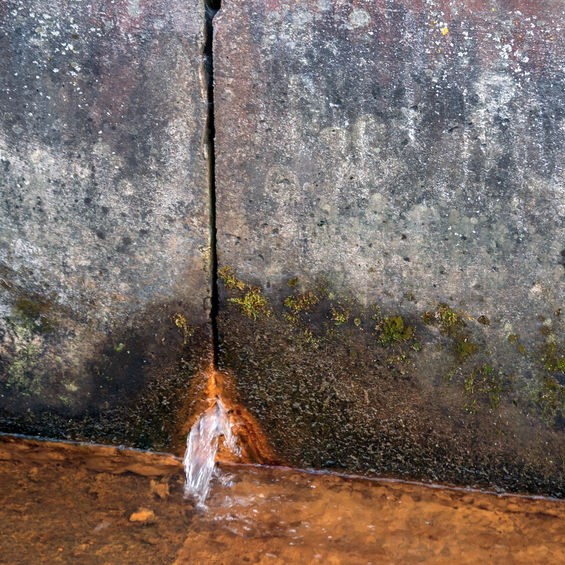
source: pinterest.com
If you notice mold or mildew growing in your home, especially near the baseboards or corners, it may be a sign of a slab leak. Damp conditions in your wall, flooring, or foundation can create a suitable environment for mold and mildew to thrive in.
So, look for visible signs of mold growth, such as black or green spots or a musty odor in the affected area. You may also notice peeling, flaking paint, or damp patches on your walls or ceilings.
Moreover, if you suspect a slab leak is the cause of the mold, it’s essential to address it promptly to prevent further damage and potential health hazards associated with mold exposure.
Things to Do if You Suspect a Slab Leak
Minimizing the action time and taking immediate initiatives always help with a slab leak. It helps to decrease the overall damage and extends your home’s longevity.
Here are some steps you can take if you think you have a slab leak.
Turn off Your Home Water Supply
You can prevent further water damage and flooding in your home by shutting off the main water valve.
The location of your main water valve may vary depending on your home’s age and construction, but it’s typically located near your water meter or where the main water line enters your home.
However, it’s essential to familiarize yourself with the valve’s location ahead of time to act quickly in an emergency.
Also, remember to turn off the power to any water heaters or appliances that use water before shutting off the main valve.
Call a Professional
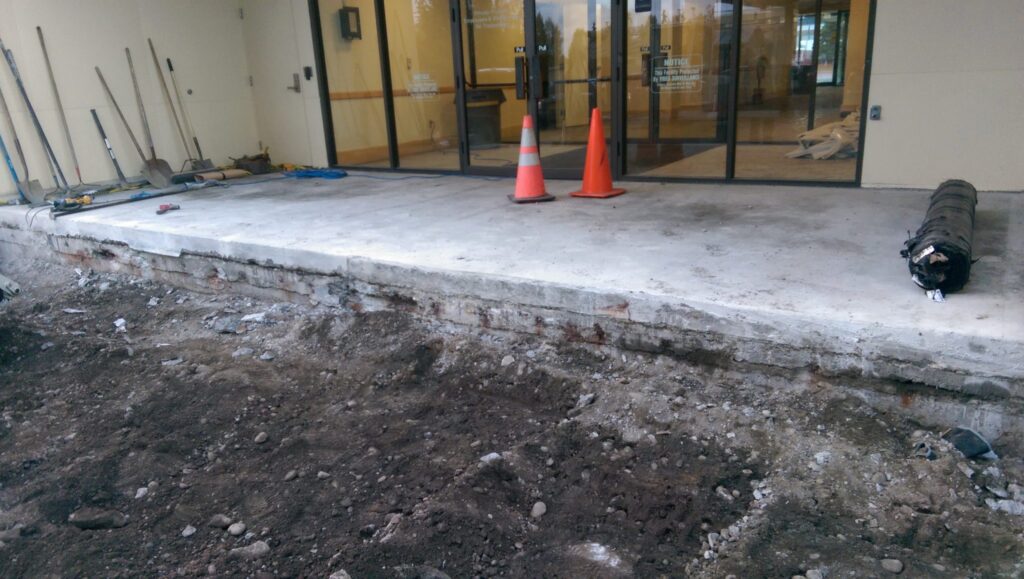
source: pinterest.com
Slab leaks aren’t a DIY project, as they can be difficult to detect and repair, requiring specialized equipment and expertise. So, it’s necessary to call a professional plumber specializing in slab leak detection and repair.
A skilled plumber can use techniques like electronic leak detection or slab penetration to locate the leak and determine the best repair actions.
Moreover, attempting to fix a slab leak yourself can be dangerous and cause further damage to your home.
By calling a professional plumber, you can ensure the issue is adequately addressed safely, avoiding costly repairs and potential health hazards associated with water damage and mold growth.
Get a Leak Detection Test
If you suspect a slab leak in your home but can’t pinpoint the location, a leak detection test from an expert can be a valuable tool.
A professional plumber can use specialized equipment like electronic leak detectors, ground microphones, and thermal imaging cameras to locate hidden leaks within your home’s foundation.
Moreover, these tools allow the plumber to pinpoint the exact location of the leak without causing any damage to your property if you’re worried about that.
So, get a leak detection test, as it can save you time and money by avoiding unnecessary excavation and repairs while also helping to prevent further damage from the leak.
Repair the Leak & the Damages
Repairing a slab leak involves fixing the leak itself and any resulting damages.
A professional plumber will assess the location and severity of the leak to determine the best course of action for repairs. Depending on the size and location of the leak, repairs may involve removing sections of your home’s foundation, repairing or replacing the damaged pipe, and sealing the affected area to prevent further water damage or mold growth.
Once the leak is repaired, any resulting damages, such as damaged flooring or walls, must also be addressed. A professional restoration company can help with repairs and clean-up to restore your home to its pre-leak condition.
How to Prevent a Slab Leak?
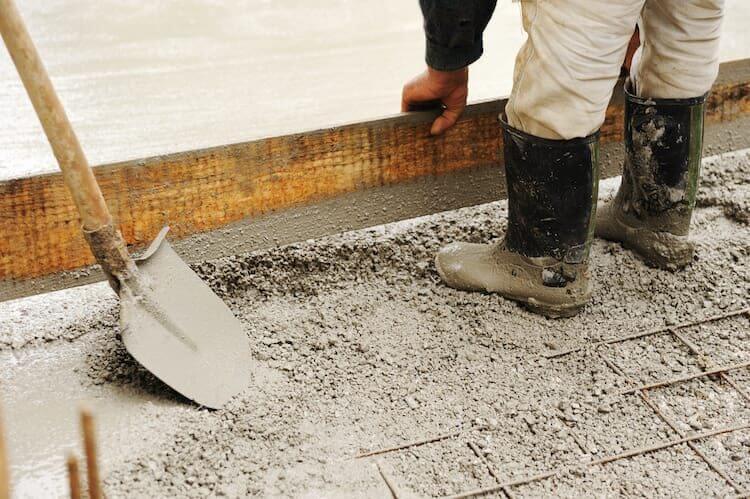
source: pinterest.com
While it’s not always possible to prevent slab leaks from occurring, there are some steps you can take to minimize the risk. Let’s dive into them!
Maintain your plumbing: Regular plumbing maintenance can help to prevent slab leaks by identifying and addressing potential issues before they become significant problems.
Monitor your water bills: Keep an eye on your water bills and look for any spikes that could indicate a leak.
Be aware of any changes in your home’s foundation: If you notice cracks or other changes in your home’s foundation, it’s essential to address them as soon as possible to prevent slab leaks.
Install a water softener: Hard water can cause corrosion in your pipes, increasing the risk of slab leaks. Installing a water softener can help to prevent this.
Maintain consistent moisture levels: If the soil around your home’s foundation is too dry or too wet, it can cause the foundation to shift, leading to slab leaks. It’s essential to maintain consistent moisture levels around your home’s foundation.
Conclusion
A slab leak is a serious plumbing issue that can cause extensive damage to your home. Recognizing the signs is crucial for avoiding costly repairs and maintaining the safety and comfort of your home.
So, act quickly by calling a professional plumber to diagnose and repair the issue. Because with prompt attention and proper repairs, you can protect your home from the effects of water damage and enjoy peace of mind knowing your plumbing is in good condition.

